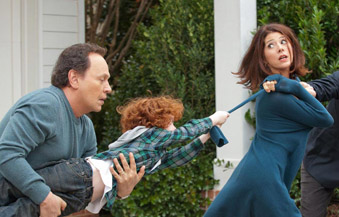Movie Review: Parental Guidance
By Matthew Huntley
January 14, 2013
BoxOfficeProphets.com

What’s perhaps most irksome about a movie like Parental Guidance is that it shows potential at the beginning but keeps letting you down the longer it goes on. Too bad it didn’t play in reverse; at least then it would have ended on a high note.
The movie stars Billy Crystal as Artie, a veteran announcer for the minor league baseball team, the Fresno Grizzlies. Artie is good at his job and loves it, but he’s unexpectedly fired when the franchise decides to redesign their image in order to appeal to a younger demographic. Artie, who’s in his mid-60s, is at a loss when his boss starts talking about things like Facebook and Twitter and uses words like “friends,” “poke” and “hash.” He’s crushed, but his wife Diane (Bette Midler) thinks this is a sign he should retire. Artie disagrees; he still dreams of announcing for the San Francisco Giants.
All this comes at a time when Artie and Diane’s daughter, Alice (Marisa Tomei), asks them to come to Atlanta for a week to watch her three kids. She wants to accompany her husband Phil (Tom Everett Scott) to an awards ceremony for product of the year - Phil designed what’s appropriately called the “Smart Home,” a fully automated housing system that talks, makes breakfast, washes the dishes, records images, etc. without the residents having to lift a finger. If you thought Artie had a hard time grasping ideas like Facebook and Twitter…
Artie and Diane aren’t exactly close with Alice or their grandchildren, probably because their antiquated parenting style differs so drastically from Alice and Phil’s modern, non-disciplinarian approach. For instance, Alice and Phil don’t believe in giving their kids sugar, and they never say things like “don’t” or “no.” Instead, the kids are instructed to “consider the consequences” and “use your words” to express themselves. It should come as no surprise, then, that Artie and Diane feel out of touch when they arrive and are saddened when there are no pictures of them on the mantle. Diane tells Artie they’ve become the “other” grandparents and so the two vow to use the week as a second chance at parenting.
Such a premise could have made (and does to some degree) for an insightful, satirical and heartwarming family comedy about an older couple learning to reinvent themselves through their younger, more technology-driven daughter and grandkids. Billy Crystal is especially good here because he excels in self-deprecating humor. He shows he’s still a master of comic timing and possesses the ability to make even the most predictable situations funny and fresh.
But once the grandkids enter the picture, the movie slowly, then more quickly, succumbs to the “dumb family comedy” syndrome. That means we’re forced to endure cheap slapstick, poop and pee jokes, and yes, even a shot to the groin, which is all but standard in comedies that are all out of good ideas. Kids will likely get a kick out of all this, and even though they’re entitled to enjoy mindless movies as much as adults, why couldn’t the grown-up filmmakers have found more inventive ways of being mindless? Everything I just listed is an example of an uninspired, tired cliché. Don’t kids deserve better?
The movie might have bypassed a lot of its problems if it only had two grandkids to deal with instead of three. The eldest, Harper (Bailee Madison), is 12 and just on the verge of adolescence. She plays the violin and is under so much pressure to be perfect and nail an upcoming audition, she’s about to explode. I applauded the way Diane tries to teach her that it’s just as important for her to relax and hang out with friends as it is to practice and focus on her future, a lesson that’s perhaps overlooked in the modern age of parenting when so many moms and dads push their kids relentlessly because they feel competition in the world is so fierce. That may be true, but kids still need to have fun; in fact, we all do.
I also liked how the middle child, Turner (Joshua Rush), isn’t necessarily made out to be the obligatory, wimpy nerd just because he fits the stereotype. It turns out this skinny, stuttering kid is actually a good baseball pitcher and possesses another hidden talent that just requires he find the courage and means to show it off.
The problem comes from the youngest grandchild, Barker (Kyle Harrison Breitkopf), whose sole function, it seems, is to be a pain in the neck, especially to Artie, whom he calls “Fartie.” The vexatious little rabble rouser blackmails him out of money, draws on his face with a neon marker, runs off on his own at the symphony, and causes trouble with his bodily functions. I lowered my head in shame during a scene that involved Barker urinating on a half-pipe and the professional skateboarder Tony Hawk trying to perform a stunt.
Parental Guidance finally gets to a point where it’s just embarrassing to watch. For some reason, the filmmakers felt they had to appeal to the lowest common denominator. Why Crystal and Midler, not to mention Tomei, signed on for this is beyond me. For the former two, the screenplay seemed to be written especially for them - it’s a well-known fact that Crystal is a huge baseball fan and the movie gives Midler not one, but two opportunities to perform a musical number. It’s a shame the movie wastes their talents and trades in its promising premise for the same garbage the intended audience has likely seen too many times.